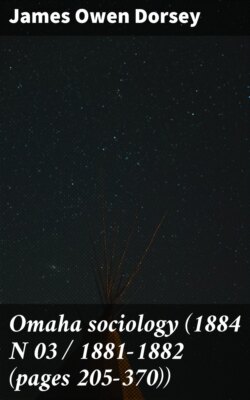Читать книгу Omaha sociology (1884 N 03 / 1881-1882 (pages 205-370)) - James Owen Dorsey - Страница 9
На сайте Литреса книга снята с продажи.
STATE CLASSES.
ОглавлениеTable of Contents
These have not been clearly differentiated. Three classes of men have been recognized: Níkagáhi, wanáce, and cénujiñ´ga.
In civil affairs, the nikagahi are the chiefs, exercising legislative, executive, and judicial functions. They alone have a voice in the tribal assembly, which is composed of them. The wanace, policemen, or braves, are the servants or messengers of the chiefs, and during the surrounding of a herd of buffalo, they have extraordinary powers conferred on them. (See §§ 140 and 297.)
The cenujiñga, or young men, are the "common people," such as have not distinguished themselves, either in war or in any other way. They have no voice in the assembly, and during the buffalo hunt they must obey the chiefs and wanace.
In religious affairs, which are closely associated with civil ones, we find the chiefs having a prominent part. Besides the chiefs proper are the seven keepers of the sacred pipes, or pipes of peace (see §§ 14-19, 287, 296), and the keepers of the three sacred tents (see §§ 13, 22-24, 36, 295). The functions of these keepers of the sacred tents, especially those of the two Hañga men, appear to be both religious and civil. Of these two men, [P]a¢in-nanpajĭ said: "The two old men, Wakan´-man¢in and [T]e-han´man¢in, are the real governors of the tribe, and are counted as gods. They are reverenced by all, and men frequently give them presents. They mark the tattooed women." Frank La Flèche denied this, saying that these two old men are the servants of the Hañga chief, being only the keepers of the sacred tents of his gens. J. La Flèche and Two Crows said that while there were some "níkacin´ga qubé," sacred or mysterious men, among the Omahas, they did not know who they were. Some of the chiefs and people respect them, but others despise them. It is probable that by níkacin´ga qube, they meant exorcists or conjurers, rather than priests, as the former pretend to be "qube," mysterious, and to have supernatural communications.
There is no military class or gens among the Omahas, though the Ponka ₵ixida gens, and part of the Nika[p]aᴐna gens are said to be warriors. Among the Omahas, both the captains and warriors must be taken from the class of cenujiñga, as the chiefs are afraid to undertake the work of the captains. The chiefs, being the civil and religious leaders of the people, cannot serve as captains or even as subordinate officers of a war party. Nor can they join such a party unless it be a large one. Their influence is exerted on the side of peace (see §§ 191, 292), and they try to save the lives of murderers. (See § 310.) They conduct peace negotiations between contending tribes. (See §§ 220, 292.)
All the members of a war party, including the captains, lieutenants, and wanace, as well the warriors, are promoted to the grade or class of (civil) wanace on their return from battle. (See § 216.)
